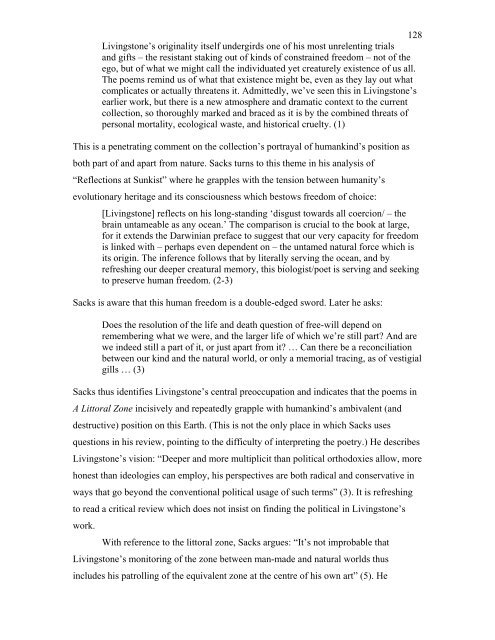"Symbiosis or Death": - Rhodes University
"Symbiosis or Death": - Rhodes University
"Symbiosis or Death": - Rhodes University
Create successful ePaper yourself
Turn your PDF publications into a flip-book with our unique Google optimized e-Paper software.
128<br />
Livingstone’s <strong>or</strong>iginality itself undergirds one of his most unrelenting trials<br />
and gifts – the resistant staking out of kinds of constrained freedom – not of the<br />
ego, but of what we might call the individuated yet creaturely existence of us all.<br />
The poems remind us of what that existence might be, even as they lay out what<br />
complicates <strong>or</strong> actually threatens it. Admittedly, we’ve seen this in Livingstone’s<br />
earlier w<strong>or</strong>k, but there is a new atmosphere and dramatic context to the current<br />
collection, so th<strong>or</strong>oughly marked and braced as it is by the combined threats of<br />
personal m<strong>or</strong>tality, ecological waste, and hist<strong>or</strong>ical cruelty. (1)<br />
This is a penetrating comment on the collection’s p<strong>or</strong>trayal of humankind’s position as<br />
both part of and apart from nature. Sacks turns to this theme in his analysis of<br />
“Reflections at Sunkist” where he grapples with the tension between humanity’s<br />
evolutionary heritage and its consciousness which bestows freedom of choice:<br />
[Livingstone] reflects on his long-standing ‘disgust towards all coercion/ – the<br />
brain untameable as any ocean.’ The comparison is crucial to the book at large,<br />
f<strong>or</strong> it extends the Darwinian preface to suggest that our very capacity f<strong>or</strong> freedom<br />
is linked with – perhaps even dependent on – the untamed natural f<strong>or</strong>ce which is<br />
its <strong>or</strong>igin. The inference follows that by literally serving the ocean, and by<br />
refreshing our deeper creatural mem<strong>or</strong>y, this biologist/poet is serving and seeking<br />
to preserve human freedom. (2-3)<br />
Sacks is aware that this human freedom is a double-edged sw<strong>or</strong>d. Later he asks:<br />
Does the resolution of the life and death question of free-will depend on<br />
remembering what we were, and the larger life of which we’re still part? And are<br />
we indeed still a part of it, <strong>or</strong> just apart from it? … Can there be a reconciliation<br />
between our kind and the natural w<strong>or</strong>ld, <strong>or</strong> only a mem<strong>or</strong>ial tracing, as of vestigial<br />
gills … (3)<br />
Sacks thus identifies Livingstone’s central preoccupation and indicates that the poems in<br />
A Litt<strong>or</strong>al Zone incisively and repeatedly grapple with humankind’s ambivalent (and<br />
destructive) position on this Earth. (This is not the only place in which Sacks uses<br />
questions in his review, pointing to the difficulty of interpreting the poetry.) He describes<br />
Livingstone’s vision: “Deeper and m<strong>or</strong>e multiplicit than political <strong>or</strong>thodoxies allow, m<strong>or</strong>e<br />
honest than ideologies can employ, his perspectives are both radical and conservative in<br />
ways that go beyond the conventional political usage of such terms” (3). It is refreshing<br />
to read a critical review which does not insist on finding the political in Livingstone’s<br />
w<strong>or</strong>k.<br />
With reference to the litt<strong>or</strong>al zone, Sacks argues: “It’s not improbable that<br />
Livingstone’s monit<strong>or</strong>ing of the zone between man-made and natural w<strong>or</strong>lds thus<br />
includes his patrolling of the equivalent zone at the centre of his own art” (5). He

















